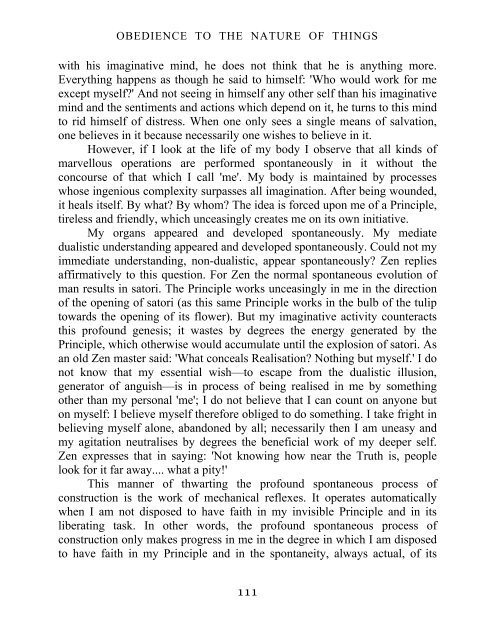The Supreme Doctrine - neo-alchemist
The Supreme Doctrine - neo-alchemist
The Supreme Doctrine - neo-alchemist
You also want an ePaper? Increase the reach of your titles
YUMPU automatically turns print PDFs into web optimized ePapers that Google loves.
OBEDIENCE TO THE NATURE OF THINGS<br />
with his imaginative mind, he does not think that he is anything more.<br />
Everything happens as though he said to himself: 'Who would work for me<br />
except myself?' And not seeing in himself any other self than his imaginative<br />
mind and the sentiments and actions which depend on it, he turns to this mind<br />
to rid himself of distress. When one only sees a single means of salvation,<br />
one believes in it because necessarily one wishes to believe in it.<br />
However, if I look at the life of my body I observe that all kinds of<br />
marvellous operations are performed sponta<strong>neo</strong>usly in it without the<br />
concourse of that which I call 'me'. My body is maintained by processes<br />
whose ingenious complexity surpasses all imagination. After being wounded,<br />
it heals itself. By what? By whom? <strong>The</strong> idea is forced upon me of a Principle,<br />
tireless and friendly, which unceasingly creates me on its own initiative.<br />
My organs appeared and developed sponta<strong>neo</strong>usly. My mediate<br />
dualistic understanding appeared and developed sponta<strong>neo</strong>usly. Could not my<br />
immediate understanding, non-dualistic, appear sponta<strong>neo</strong>usly? Zen replies<br />
affirmatively to this question. For Zen the normal sponta<strong>neo</strong>us evolution of<br />
man results in satori. <strong>The</strong> Principle works unceasingly in me in the direction<br />
of the opening of satori (as this same Principle works in the bulb of the tulip<br />
towards the opening of its flower). But my imaginative activity counteracts<br />
this profound genesis; it wastes by degrees the energy generated by the<br />
Principle, which otherwise would accumulate until the explosion of satori. As<br />
an old Zen master said: 'What conceals Realisation? Nothing but myself.' I do<br />
not know that my essential wish—to escape from the dualistic illusion,<br />
generator of anguish—is in process of being realised in me by something<br />
other than my personal 'me'; I do not believe that I can count on anyone but<br />
on myself: I believe myself therefore obliged to do something. I take fright in<br />
believing myself alone, abandoned by all; necessarily then I am uneasy and<br />
my agitation neutralises by degrees the beneficial work of my deeper self.<br />
Zen expresses that in saying: 'Not knowing how near the Truth is, people<br />
look for it far away.... what a pity!'<br />
This manner of thwarting the profound sponta<strong>neo</strong>us process of<br />
construction is the work of mechanical reflexes. It operates automatically<br />
when I am not disposed to have faith in my invisible Principle and in its<br />
liberating task. In other words, the profound sponta<strong>neo</strong>us process of<br />
construction only makes progress in me in the degree in which I am disposed<br />
to have faith in my Principle and in the spontaneity, always actual, of its<br />
111




